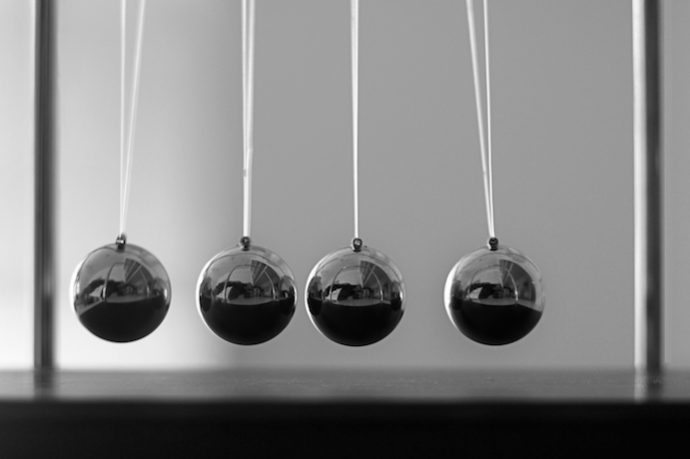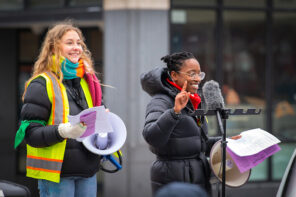As the U.S. Supreme Court continues to mull the arguments of a baker who on religious grounds refused to design a custom cake for a same-sex wedding, two cases elsewhere this week suggested that however the high court rules, religious exemptions will remain a front line in ongoing cultural clashes about sexual diversity.
Those who support equality for gay and lesbian couples should pay particularly close attention to these developments, since they come at a time when polls indicate that acceptance of LGBTQ people has undergone a slight decline. In January, GLAAD reported that after years of movement toward equality, “this year, the acceptance pendulum abruptly stopped and swung in the opposite direction.” Among the contributing factors, GLAAD hypothesized, could be President Donald Trump’s attempted ban on trans servicemembers, the nomination and confirmation of conservative Justice Neil Gorsuch, and attempts at the state and local levels to pass laws restricting the rights of LGBTQ citizens.
The first of this week’s cases seems eerily familiar. With a set of facts nearly identical to Masterpiece Cakeshop, the wedding-cake case that a sharply divided Supreme Court heard in December, Department of Fair Employment and Housing v. Cathy’s Creations, Inc., involves a baker who denied service to a same-sex couple. Two women asked Cathy Miller’s bakery in Bakersfield, California, to create a custom cake for their wedding reception. She declined, citing her Christian faith and opposition to same-sex marriage. There is this one substantial difference between the cases: unlike Jack Phillips, the baker in Masterpiece Cakeshop, Miller has arranged for another bakery to handle orders for same-sex wedding cakes that come her way, and in fact, she did refer the couple to her designated competitor.
Without waiting for the Supreme Court to weigh in on the broader issues at stake, California Superior Court Judge (and Arnold Schwarzenegger appointee) David R. Lampe ruled emphatically in favor of the baker. “The State cannot succeed on the facts presented as a matter of law,” he wrote. “The right to freedom of speech under the First Amendment outweighs the State’s interest in ensuring a freely accessible marketplace.”
Arguing that “[a] wedding cake is not just a cake in a Free Speech analysis,” Judge Lampe went so far as to claim that “[t]here could not be a greater form of expressive conduct” than the “artistic expression” involved in designing a custom wedding centerpiece. Much as generations of artists, sculptors, musicians, playwrights, novelists, and maybe even “Subway sandwich artists” might wish to disagree, Judge Lampe unequivocally equated the design of custom cakes with these traditionally protected forms of speech.
While Miller’s attorneys based their arguments on both the Free Speech and Free Exercise clauses of the Constitution, Judge Lampe declined to comment on the latter “because the case is sufficiently resolved upon Free Speech grounds.” But his ruling made clear that Miller denied service to the lesbian couple because she “is a practicing Christian and considers herself a woman of deep faith.”
Not long after Judge Lampe exempted Miller from the requirements of California’s Unruh Civil Rights Act, a substantial monetary settlement was made public in a North Carolina case. Gayle Myrick served as a state magistrate for a little more than three years, but when same-sex marriage was approved in North Carolina in 2014, she sought a religious exemption from the requirement that she perform same-sex marriages as part of her duties. Denied the concession that she proposed—that her schedule be adjusted so that she would not be on duty during the hours when marriages can be performed—Myrick resigned, in the process losing retirement benefits that were soon to be vested.
She filed a complaint with the federal Equal Opportunity Employment Commission (EEOC), charging her supervisors with discrimination on the basis of religion. In March of last year, EEOC administrative law judge Michael J. Devine ruled in Myrick’s favor. In a case entitled Myrick v. Warren, he found that Myrick’s supervisors had not fulfilled their constitutional obligation, under the Free Exercise Clause, “to at least explore the options and provide an accommodation unless granting the accommodation would cause an undue burden.” Devine ordered that the North Carolina courts provide Myrick with back pay, compensate her for her attorney’s fees, and determine whether a position exists to which she might be reinstated. As we recently learned, the parties ended up settling for nearly $225,000 in compensation and $115,000 in attorney’s fees.
Two cases do not make a trend, but these decisions from California and North Carolina suggest that it would be naïve to assume that legal equality for LGBTQ individuals and families is settled, or at least well on its way there. Because much, if not in fact most, opposition to LGBTQ rights has religious roots, arguments about religious freedom, and claims about the exemptions due religious believers in their dealings with their LGBTQ fellow citizens, will continue to figure prominently in our national debates.
In parallel with the survey data reported by GLAAD, both legislators and courts have lately shown interest in favoring religious exemptions over LGBTQ rights. In 2016, Mississippi enacted its Religious Liberty Accommodations Act, which prohibits the state from taking action against certain religious organizations, government employees, and private businesses with anti-LGBTQ beliefs; a suit against the law was ultimately dismissed by the Fifth Circuit Court of Appeals on the technical grounds that the plaintiffs lacked standing. And just recently, the U.S. House of Representatives took up an education bill that carves out exemptions from federal regulations for higher education institutions with religious missions.
As Columbia University law professor Kent Greenawalt pointed out in a 2017 book, the very structure of the First Amendment’s religion clauses makes resolving disputes of this sort unusually difficult. While the Free Exercise Clause limits the power of government to compel citizens to act against sincerely held religious beliefs, the Establishment Clause (as well as the Constitution’s equal protection provisions) aims to ensure that no individual set of beliefs is privileged over others. Indeed, Justice Anthony Kennedy’s landmark decision in Obergefell v. Hodges recognized that “religions, and those who adhere to religious doctrines, may continue to advocate with utmost, sincere conviction” their beliefs about same-sex marriage, and that “[t]he First Amendment ensures that religious organizations and persons are given proper protection.”
But what exactly should the scope of that protection be? Continue to watch for cases involving religious exemptions from federal, state, and local laws. They are where the next set of battles about the full legal and human dignity of both LGBTQ citizens and religious citizens will be fought.





